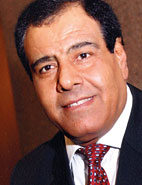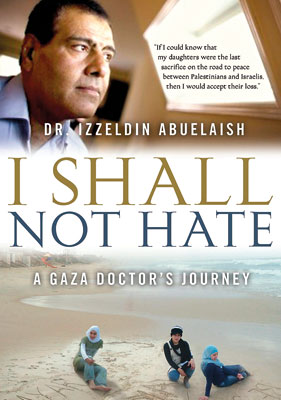“As a Palestinian, my life was a war,” Dr. Izzeldin Abuelaish is saying. “You expect the worst of tomorrow. You say, ‘Thank god, I am alive today, but I don’t know what will happen tomorrow’. ” His voice cracks a little on the last words as our internet connection falters and the video feed stutters. Frozen on my screen for that moment is one of the most famous faces to be associated with the Israel-Palestine conflict in recent years.
The ‘Gaza Doctor’ has become a passionate advocate for peace, uniting both Palestinians and Israelis who feel the same. He has been nominated for a Nobel Peace Prize, has made the lists of the most influential Muslims in the world and had even Barack Obama quoting from his book ‘I Shall Not Hate’. Sadly, the reason Dr. Abuelaish is so well known involves a tragedy that was both horrific and public – you need only type his name into a youtube search to find the 2009 video that dragged him into the limelight.
 |
| Advocate for peace: Dr. Abuelaish |
It opens innocuously enough with a shot of a news desk on an Israeli T.V programme, but when the anchor Shlomi Eldar puts his phone onto the loud speaker, the sound of Dr. Abuelaish’s voice fills the room. He is saying, “I tried to save them, but they died from head wounds immediately, Shlomi.” Two shells fired into the upper floor of the Abuelaish residence have left his niece Noor and his daughters Bessan, Mayar and Aya literally in pieces. The doctor’s voice is hoarse with grief as he wails for the children. Eldar is visibly moved. He refuses to hang up on the call and simply walks out on the show and his day’s guest, Foreign Minister Tzipi Livni.
The Israeli reporter then begins to pull every string he can, attempting to get an ambulance to the scene where Dr. Abuelaish’s surviving daughter, 16 –year-old Shatha is waiting, blinded in one eye, blood flowing from the stumps of her fingers. In the end, neighbours help carry the wounded for a quarter of a mile until they finally meet the ambulances and T.V crews and Shatha and her uncle become the first Palestinian casualties of the war to be evacuated to an Israeli hospital.
The scene was made all the more poignant because they were all only one day away from a unilateral ceasefire that would bring the 22-day assault on the Gaza Strip to an end. Brought on by Hamas firing Qassam rockets into Israeli border towns, the ground invasion dubbed Operation Cast Lead cost 13 Israeli lives and killed an estimated 1,400 Palestinians - 300 of whom were children. The only reason Aya, Mayar and Bessan stand out is because their father’s terrible grief was immortalised on T.V. Dr. Abuelaish doesn’t resent this – he is content that he was, for that day, the face of Palestinian suffering. “The Palestinians had just become numbers. Human beings are more than numbers,” says Dr. Abuelaish. A devout Muslim, he believes it was God’s will that Eldar answered that call on air.
In the days before, Israeli audiences had already become familiar with the sound of the doctor’s voice. No one knew what was happening inside Gaza, and so the Channel 10 news team would call Dr. Abuelaish, a fluent speaker of Hebrew, for updates. He had picked up the language after years spent working across the border, most recently as a consultant obstetrician at the Gertner Institute at the Sheba Hospital in Tel Aviv – making him the first Palestinian doctor to receive a staff position at an Israeli hospital. It was no small accomplishment for a boy who had grown up in a three metre by three metre room in the Jabalia refugee camp.
In an interesting twist, what was his family’s land in the village of Houg was taken over and is now the former Israeli Prime Minister Ariel Sharon’s personal farm. Dr. Abuelaish still has the deeds. “They took the land, but they couldn’t take away our hope. They didn’t take our determination – you can intimidate, humiliate, imprison and threaten someone, but you can’t prevent them from dreaming and hoping,” says Dr. Abuelaish, remembering his parents’ determination to give their children a better life.” A young Izzeldin already knew what he would like to do with his: “I wanted to become a doctor because medicine has a human face – where a human being and a human life is the most precious thing in the universe,” he says earnestly.
He would begin practising in 1991. Going over the border, Dr. Abuelaish would have to cross 20 checkpoints. Though the guards knew him well enough to ask his advice on matters like birth control, they also remained suspicious and often kept him waiting – sometimes for hours. “I was there physically at the checkpoints but my mind was at the hospital thinking of the patients who are waiting for me,” he says, explaining he tried always to “keep my energy for something greater.” It could get incredibly frustrating. One day, he left his briefcase – filled with crucial travel permits - behind at a checkpoint by accident. Rushing the 27 miles back, he arrived to find it had been blown up by the soldiers.
 |
On another day in 2008, he would be stuck at a different set of checkpoints for 14 hours while his wife waited in an Israeli hospital. She was dying of leukaemia and he was told she had taken a turn for the worse. By the time he reached her bedside she was already unconscious. She would pass away without ever opening her eyes again. That journey should have taken only an hour.
Still, in the face of all this, Dr. Abuelaish persevered. “Israelis used to see Palestinians as workers, as people who are serving them in the farms and the factories. I wanted my Israeli colleagues to see the human face...to climb those barriers they had created in their minds and their hearts. I believed it was time for us all to focus on saving lives.” He embraced this vision once more in the wake of his great loss – while he was hated and reviled by some, he also found his grief was shared by families from Israel and Palestine, both.
“Sometimes you hate because you don’t know others. As long as you don’t know, you keep hating,” he says, sharing his faith that open and honest communication could save both communities. “Hate is a poison, hate is a fire. You spark the fire and you start to burn yourself. You are burning from inside, you are consuming your soul, your spirit, your energy. With hate, you are a victim again. Don’t accept being a victim more than once.”
Just minutes before our Skype conversation began, Dr. Abuelaish received some news – in early 2011, he decided to sue the Israeli government for an apology. Indignation colouring his voice, he says, “Tthe Israeli court wants me to pay 25,000 dollars in advance to handle my case. They are not helping to close this wound; they are trying to open it, to add salt to this wound. It’s a shame.” He’s pursuing this apology which such determination because he believes it is an “an engine” that both perpetrator and victim can ride into the future together. “We don’t want this apology to criticise each other. We are human beings – it is a mistake if we learn from it. It is not a mistake if we repeat it.”
If he were to be awarded damages, Dr. Abuelaish plans to channel it into his ‘Daughters for Life Foundation’. “I want to see the plans, the dreams of my daughters fulfilled by other girls,” he reveals. The foundation provides girls from Palestine, Jordan and Israel with educational grants and scholarships. “I feel I am accountable, I am watched by my daughters. I fully believe I have to meet them one day,” he tells me. He wants to be able to tell them then that he delivered what justice he could; valuing always what they valued while still alive: “talent, wisdom, kind words and good deeds.”
In the meantime, he has much to live for. His sons, Mohammed, Raffah and Abdallah are still young. As for Shatha, he proudly reveals she scored 96% in the exams she sat while still recovering from her injuries. “She has taken so much in life, mountains can’t bear it,” he says. Shatha, who sounds as brave as her father, is now studying for her degree in computer engineering in Toronto, where the Abuelaish family resides now.
Though his children will grow up in another country, Gaza is never far from Dr. Abuelaish’s thoughts. “I am there. It is my place. It’s in every part of my body, in every cell. It’s the place where my beloved ones are buried, my father, my mother, my wife, my daughters, my niece. Every good thing is there. I carry it everywhere.” He clings, also, to the memory of his family.
As a participant in the Galle Literary Festival, he will be stepping onto a plane to Sri Lanka on January 16 - the anniversary of his children’s’ deaths. He will spend it as he has the others before: “In my flight I will send my daughters the blessing, I will tell them, you are alive, and you are with me. I am not resting. I am travelling everywhere, spreading the message that you carried.” |



